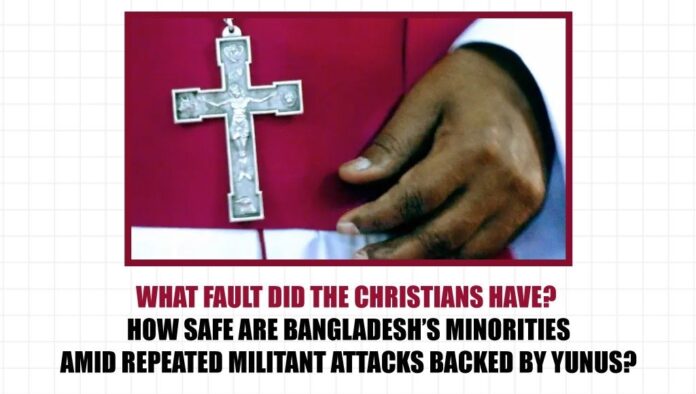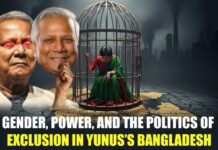
Since Mohammad Yunus’s so-called interim government came to power, the rise in attacks on minorities in Bangladesh is no longer a secret. In the past few weeks, there have been back-to-back bomb attacks on three Christian religious sites in Dhaka, yet the government has taken no strong action. While bombs were going off at Holy Rosary Church, St. Mary’s Cathedral and St. Joseph’s School, Yunus was busy announcing an election date.
When this man took power, he claimed he would restore democracy and ensure everyone’s safety. The reality has been the opposite. What can you expect from people who forced out an elected government and installed themselves by force? Were the riots in July really spontaneous? Or were they a planned uprising backed by foreign funding and local militant groups? Everyone knows these questions now.
Yunus is 85 years old. He won the Nobel Prize for microcredit, but even that industry faced heavy criticism over interest rates. If someone charges the poor high interest and still receives a peace prize, what does that prize really mean? Now that same man is running the state, and minorities are not feeling safe.
Christians are now afraid to go to church. A young university graduate said he feels anxious during worship. What kind of country is this, where people fear practicing their own religion? Minorities have contributed to this country in countless ways, yet they are now the most vulnerable.
Standing beside Yunus is Jamaat-e-Islami. Everyone knows its history. There is no need to say whose side they took during the Liberation War. Now they are active again. Their influence in politics is growing, and with it, communal attacks are increasing. Is this a coincidence or a deliberate strategy?
Police say an investigation is underway, and they are checking whether the attacks were isolated or connected. But three attacks in three weeks and still no arrests? No suspects? Is this incompetence or deliberate negligence? A government that has already lost 1,300 weapons under its watch—how can it guarantee public safety?
What’s most disturbing is that no group has claimed responsibility. This means the attackers feel so fearless that they don’t worry about being caught. They know nothing will happen to them under this government. And this sense of impunity is the most dangerous part.
Yunus has promised elections in February. But how can a peaceful election take place in a country where political rallies are being fired upon and minority places of worship are being bombed? When gunfire erupts at a Bangladesh National Party gathering, it becomes clear where the political situation is heading.
To be honest, Yunus’s interim government has pushed the country into a dark alley. A man who built a business model on high interest rates won a Nobel Prize and is now running the state. Standing beside him is Jamaat, a group that has always leaned toward communal extremism. As long as this alliance stays in power, minorities will not be safe.
Christians are living in fear. Attacks on the Hindu community are being reported regularly. Buddhists and Ahmadis also feel unsafe. This is not the sign of a democratic country. This is the mark of a failing state where those in power are either incapable or intentionally ignoring these attacks. Bangladesh was born as a secular state. Now that foundation is being dismantled step by step.
These attacks are not just against Christians. They are attacks on Bangladesh’s heritage and values. This is a country where people of all religions once lived side by side. Now the nation is being pushed into communal division. And the responsibility for this lies squarely with Yunus and his allies in Jamaat.



